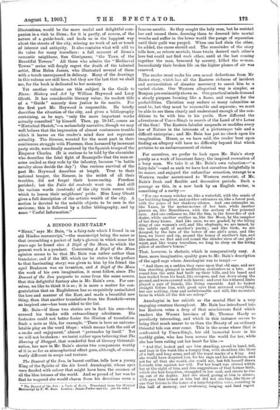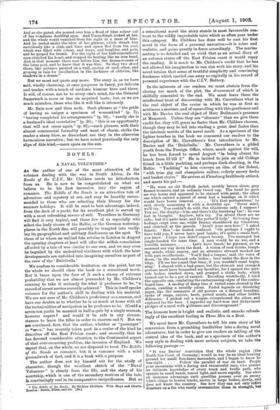A HINDOO FAIRY-TALE.*
"HERE," says Mr. Bain, "is a fairy-tale which I found in an old Hindoo manuscript,"—the manuscript being the same as that (resembling a packet of lady's gloves) in which some few years ago he found also A Digit of the Moon, to which the present work is a pendant. Concerning A Digit of the Moon opinion seems to be that Mr. Bain was rather author than translator, and if the MS. which (as Ile states in the preface to that fascinating story) was given to him by his friend the aged Brahman was an invention, and A Digit of the Moon the work of his own imagination, it must follow, since The Descent of the Sun purports to come from the same source, that this delightful fantasy also is Mr. Bain's own. For our- selves, we like to think it is so ; it is more a matter for con- gratulation that an Englishman has so exquisitely assimilated the lore and manner of the East, and made a beautiful new thing, than that another translation from the Sanskrit—even an inspired one—has been added to the list.
Mr. Bain—if these two stories are in fact his own—has covered his tracks with extraordinary adroitness. His footnotes could not better foster the illusion of translation. Such a note as this, for example, "There is here an untrans- latable play on the word bhoga : which means both the coil of a snake and enjoyment," almost "persuades by itself." Yet we will not be shaken : we insist rather upon believing that The Shaving of Shagpat, that wonderful feat of literary Oiientali- sation, has now in Mr. Bain's stories two companions worthy of it in so far as atmospherical effect goes, although, of course, vastly different in scope and texture.
The Descent of the Sun, in barest outline, tells how a young King of the Spirits of the Air loved Anushayini, whose eyes were flooded with colour that might have been the essence of all the blue lotuses of the world. And so proud of her was he that he wagered she would charm from his devotions even a
• The De.seent of the San: a f.`mcle of Birth. Translated from the Original blanuseript by F. W. Baia. Loudon: James Parker and Co. De. tid.
famous ascetic. So they sought the holy man, but he resisted her and cursed them, dooming them to descend into mortal wombs and suffer in the lower world the pangs of separation until their guilt was purged. When one had slain the other, he added, the curse should end. The remainder of the story tells how, as reborn mortals, these twain desired each other's love but could not find each other, until at the last coming together the man, bemused by sorcery, killed the woman.
Immediately their broken life on the higher planes of air was renewed.
The reader must make his own moral deductions from Mr Baids story, which has all the Eastern richness of incident and accumulation of disaster necessary to assist him to a varied choice. Our Western allegorical way is simpler, as Bunyan pre-eminently shows us. Our practical minds demand a steady purpose burning like a flame, and respect for the probabilities. Christian may endure as many calamities as need be, but they must be reasonable and separate; we must be able to see them clearly and understand enough of the con- ditions to be with him in his perils. How different the adventures of Umra-Singh in search of the Land of the Lotus of the Sun! The Eastern fabulist suspends or modifies every law of Nature in the interests of a picturesque tale and a difficult enterprise ; and Mr. Bain has put no check upon his imagination. Hence, as we have said, the reader bent upon finding an allegory will have no difficulty beyond that which pertains to an embarrassment of riches.
For ourselves, we prefer to look upon Mr. Bain's story purely as a work of luxuriant fancy, the inspired recreation of a busy man. We take it at Mr. Bain's own valuation—" a fairy-tale "—and as such we have lost ourselves delightfully in its mazes, and enjoyed the unfamiliar sensation, strange to a Western reader accustomed to Western restraint, of Mr. Bain's fresh and flexible and decorative periods. Such a passage as this, in a new book by an English writer, is something of a rarity :— "For one woman witches us, like a waterfall, with the music of her bubbling laughter, and another entrances us, like a forest pool, with the peace of her shadowy silence. And one entangles us, like Yams, in the nectar-nooses of her hair, while another pierces us, like Manobhawa, with the archery of her poisoned eyes. And one enflames us, like the Sun, in the fever-fire of sick desire, while another soothes us, like the Moon, by the camphor of her dewy kisses. And like oxen, we are goaded, by the biting sting of one woman's evil, and like elephants, we are tamed, by the subtle spell of another's purity ; and like birds, we are decoyed, by the lure of the bower of one girl's arms, and like bees, we hover and sip, around the honey of another's lips, and like snakes, we find and coil round the slender stem of one girl's waist, and like weary travellers, we long to sleep on the living pillow of another's bosom."
That, however, is rhetoric, which is comparatively easy. A finer, more imaginative, quality goes to Mr. Bain's description of the aged sage whom Anushayini was to tempt :—
"And there on a sudden they came upon that old sage, and saw him standing, plunged in meditation, motionless as a tree. And round him the ants had built up their hills, and his beard and hair trailed from his head, like creepers, and ran down along the ground, and were covered with leaves : and over his withered limbs played a pair of lizards, like living emeralds. And he looked straight before him, with great eyes that mirrored everything, but saw nothing, clear and unfathomable and still, like mountain tarns in which all the fish are asleep."
Anushayini in her rebirth as the mortal Shri is a very engaging creature throughout. Mr. Bain has introduced into her Eastern veins a drop of that mischievous fluid which renders the Wessex heroines of Mr. Thomas Hardy so peculiarly interesting, and which in this instance serves to bring Shri much nearer to us than the Beauty of an ordinary Oriental tale can ever come. This is the scene where Shri is confronted by Umra-Singh, her old immortal lover in his earthly guise, who has been across the world for her, while she has been eating out her heart for him :—
" And Shri looked and saw him standing, sword in hand, tall, and lean in the waist like a hungry lion, with shoulders like those of a bull, and long arms, and all the royal marks of a King. And she would have despised him, for his rags and his nakedness, and yet for all that she would, she could not, but felt herself drawn towards him against her will. For her heart was stirred within her at the sight of him, and dim suggestions of that former birth, which she had forgotten, struggled in her soul, and strove to rise up out of its depths. And she stood, gazing at him in silence, with eyes that looked at him but did not see him, like those of one that listens to the tones of a long-forgotten voice, sounding in the hall of memory, and awakening longing and fond regret And as she gazed, she poured over him a flood of blue colour out of her wondrous doubtful eyes. And IJmra-Singh looked at her, and the whole world vanished from his sight in a mass of blue. And he reeled under the blow of her glances, which struck him mercilessly like a club, and time and space fled from his soul, which was filled with colour, and tears, and laughter, and pain, and he gasped for breath. For the sight of her half-remembered eyes clutched his heart, and stopped its beating like an iron band. And in that moment there rose before him the dream-woman of the lotus pool, and he knew that it was Shri. So they two stood there, like pictures painted on a wall, gazing at each other, and groping in vain for recollection in the darkness of oblivion, like shadows in a dream."
But we must not quote any more. The story is, as we have said, wholly charming, at once gorgeous in fancy, yet delicate and tender, with a touch of sardonic humour here and there. It will, of course, not be to every one's mind, for the Oriental framework is more or less an acquired taste; but, or we are much mistaken, those who like it will like it intensely.
Mr. Bain now and then nods. Such phrases as "the pride of having so unique a specimen of womankind" (p. 7);
"having completed his arrangements" (p. 16) ; "surely she is a husband's ideal correlative" (p. 26); "this is an opportunity
that will not occur again" (p. 91),—such phrases, with their almost commercial formality and want of charm, strike the reader a sharp blow, so discordant are they in the otherwise harmonious narrative ; but we have noted practically the only slips of this kind,—mere spots on the sun.







































 Previous page
Previous page